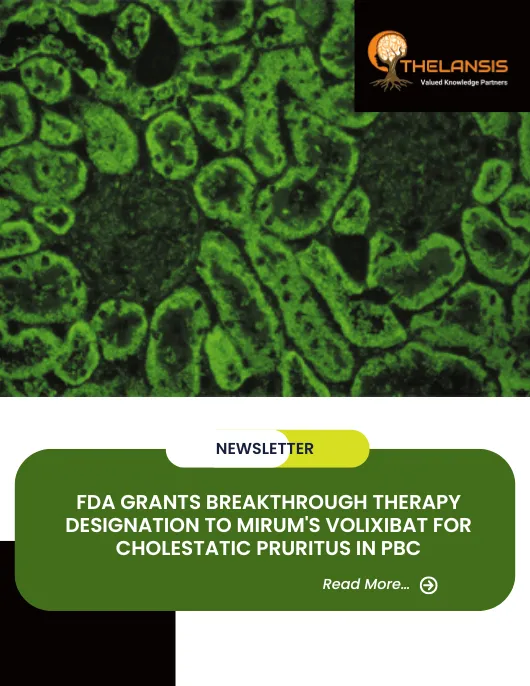
Oct 10 2024
/
FDA Grants Breakthrough Therapy Designation to Mirum’s Volixibat for Cholestatic Pruritus in PBC
Mirum Pharmaceuticals, Inc. has announced that the U.S. Food and Drug Administration (FDA) has awarded Breakthrough therapy designation to their drug, volixibat, as a potential treatment for cholestatic pruritus in patients with primary biliary cholangitis (PBC). This designation was granted following positive interim results from the Phase 2b VANTAGE study, which demonstrated statistically significant improvements in pruritus symptoms compared to a placebo for patients treated with volixibat.
Publish Date: 10-10-2024 Source: Mirum Pharmaceuticals, Inc.
Primary biliary cholangitis (PBC), once known as primary biliary cirrhosis, is a chronic ailment involving progressive damage, inflammation, and eventual destruction of the liver’s small bile ducts. Bile, a crucial digestive fluid produced by the liver, plays a vital role in processing food and expelling toxins, cholesterol, and aged red blood cells from the body. However, when these bile ducts suffer harm, bile accumulates in the liver, leading to irreversible scarring of liver tissue, a condition known as cirrhosis. Activated CD4 and CD8 lymphocytes drive the continual deterioration of these small and medium-sized bile ducts. In adults experiencing cholestasis (elevated levels of alkaline phosphatase (ALP) or gamma-glutamyl transferase (GGT)), suspicions of PBC arise once obstructive jaundice and systemic diseases have been ruled out through abdominal ultrasound. A confirmed diagnosis is made when disease-specific autoantibodies, such as antimitochondrial autoantibodies (AMA titer>1:40) and anti-nuclear autoantibodies (ANA) anti-sp100 and anti-gp210, are detected. Other conditions include autoimmune hepatitis, primary sclerosing cholangitis, alcoholic and non-alcoholic steatohepatitis, and drug-induced hepatotoxicity. The primary goal of treatment is to alleviate symptoms and slow the progression of the disease. Ursodeoxycholic acid (UDCA) at a dose of 13-15 mg/kg/day effectively improves transplant-free survival, though its impact on fatigue and itching is limited. For patients with insufficient responses (25%-40%), obeticholic acid may be introduced. Cholestyramine is the initial treatment for itching, with rifampin recommended for those intolerant or resistant to it. In patients with normal or near-normal liver biochemistry while on UDCA, their liver transplant-free survival is comparable to that of the general population. Conversely, those with abnormal liver biochemistry on treatment face significantly reduced survival rates. Following a liver transplant, the recurrence of PBC can be as high as 18% at five years and up to 30% at ten years, with risk factors for recurrence still lacking consensus. While hepatocellular carcinoma (HCC) is rare in PBC, non-response to UDCA after a year of therapy and male gender increase the likelihood of developing HCC.
- The prevalence of PBC in the United States has risen substantially, with a 114% increase in men (from 7.7 to 15.4 per 100,000 persons) and a rise from 33.5 to 57.8 per 100,000 persons in women.
However, the current Primary biliary cholangitis (PBC) treatment market share, market uptake, and attribute analysis concerning the most potential emerging therapies (Saroglitazar Magnesium, Setanaxib, ASC42, EDP-305, etc..) has been provided under the market outlook section of the study covering 8 MM countries; The United States, EU5 (Germany, Spain, France, Italy, UK) Japan and China.
In terms of pharmacologic therapies, several pharmaceutical products are being approved and under different phases of development for the Primary biliary cholangitis treatment. The key companies in the advanced development stage are Zydus Therapeutics Inc., Calliditas Therapeutics Suisse SA, Gannex Pharma Co., Ltd., Enanta Pharmaceuticals, Inc, etc..
Based on solid domain and business knowledge, Thelansis Knowledge Partners has published the market outlook forecast report on Primary biliary cholangitis (PBC) to provide a clear understanding of disease area background, epidemiology, current and future competitions, the country-specific standard of care, and the complete market forecast for 2023 to 2033.
Thelansis specializes in pharmaceutical market outlook and market forecast reports. We published reports across the therapeutic area, including rare / ultra-rare and mainstream indications. Over the period, we have built a robust repository of 6,000+ Bio-pharma reports that cover Epidemiology studies and Market forecasting based on the KOL opinions.
Competitive intelligence and track of trial results throughout the phases of development executed by a team of a mix of Scientific and Business backgrounds. As an organization, the primary focus is to provide real-world data evidence and market insight to pharmaceutical companies for their decision-making.
- Delivery Office:
B-1030, C Wing Vrindavan tech village, Outer ring road
Bangalore- 560037
India+91(124)404-1731
clientsupport@thelansis.com - Sales office:
183 Asylum Street Hartford,
CT-06103, USA
Contact no. +1 (302) 380-3552
m.berg@thelansis.com
Related posts:
- FDA Accepts Blueprint Medicine’s AYVAKIT® Supplemental NDAs for Treatment of Indolent Systemic Mastocytosis
- IVERIC bio’s Avacincaptad Pegol Receives Breakthrough Therapy Status from FDA for Geographic Atrophy Treatment
- Moderna’s mRNA-1345 Receives Breakthrough Designation from FDA for Respiratory Syncytial Virus (RSV) Prevention
- INOVIO’s INO-3107 Granted FDA Breakthrough Therapy Designation for RRP Treatment

